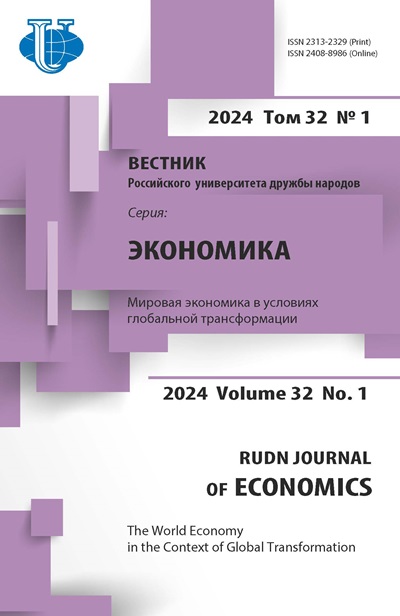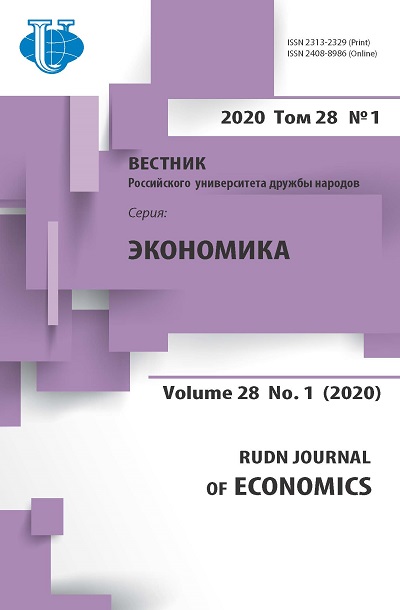Econometric evaluation of the scientific and technical progress parameter in the innovative exogenous economic growth model
- Authors: Lazareva E.I.1, Lozovitskaya D.S.1
-
Affiliations:
- Southern Federal University
- Issue: Vol 28, No 1 (2020)
- Pages: 123-136
- Section: ECONOMIC GROWTH AND SOCIO-ECONOMIC DEVELOPMENT
- URL: https://journals.rudn.ru/economics/article/view/23498
- DOI: https://doi.org/10.22363/2313-2329-2020-28-1-123-136
Cite item
Full Text
Abstract
The article explores the problem of assessing the scientific and technological progress (STP) parameter in the exogenous economic growth model in the context of modern innovative digital transformation of the economy. The aim of the study is to develop and empirically verify an econometric model for an integrated assessment of the degree of economic agents’ innovative activity influence on the gross regional product. In accordance with the set goal, a methodologically triune (resource-management-resultant) approach to identifying the STP parameter and the corresponding system of economic agents’ innovative activity indicators of the factors are substantiated, an integral-estimated four-module economic mathematical model is proposed and tested. The results of the model testing make it possible to recommend an econometric approach for application in order to analyze and evaluate the scientific and technological progress parameter in innovative spatial economic development trajectories study.
About the authors
Elena I. Lazareva
Southern Federal University
Author for correspondence.
Email: el_lazareva@mail.ru
Doctor of Economics, Professor, Head of the Department of Innovation and International Management
105/42 Bolshaya Sadovaya St., Rostov-on-Don, 344000, Russian FederationDaria S. Lozovitskaya
Southern Federal University
Email: hare01@yandex.ru
postgraduate student of the Department of Innovation and International Management
105/42 Bolshaya Sadovaya St., Rostov-on-Don, 344000, Russian FederationReferences
- Acemoglu, D., Akcigit, U., Alp, H., Bloom, N., & Kerr, W. (2018). Innovation, Reallocation, and Growth. American Economic Review, 108(11), 3450–3491.
- Acemoglu, D., Johnson, S., & Robinson, J.A. (2005). Institutions as a Fundamental Cause of Long-Run Growth. In P. Aghion & S.N. Durlauf (Eds), Handbook of Economic Growth (pp. 385–472). Amsterdam: North-Holland.
- Aghion, P., & Bolton, P. (1997). Theory of trickle-down growth and development. Rev. Econ. Stud., 64, 87–110.
- Aghion, P., Akcigit, U., & Howitt, P. (2015). The Schumpeterian Growth Paradigm. Annual Review of Economics, 7, 557–575.
- Akaev, A.A. (2015). Modeli innovacionnogo jendogennogo jekonomicheskogo rosta AN-tipa i ih obosnovanie [AN-type models of innovative endogenous economic growth and their justification]. MIR (Modernizacija. Innovacii. Razvitie), 6(2), 70–79. (In Russ.)
- Anopchenko, T.Ju., Lazareva, E.I., Lozovitskaya, D.S., & Murzin, A.D. (2019). Analiz kljuchevyh parametrov ustojchivogo innovacionnogo razvitija regiona v uslovijah cifrovizacii jekonomiki [Analysis of key parameters of sustainable innovative development of the region in the context of digitalization of the economy]. Nauka i obrazovanie: hozjajstvo i jekonomika, predprinimatel'stvo, pravo i upravlenie, 1(104), 7–12. (In Russ.)
- An'shin, V.M. (1993). Innovacionnaja strategija v uslovijah rynka [An innovative strategy in a market environment]: Analytical review. Moscow: VNTIcentr Publ. (In Russ.)
- Barro, R.J., & Sala-i-Martin, X. (2004). Economic Growth. MIT Press, Cambridge, MA, USA.
- Elsner, W., Heinrich, T., & Schwardt, H. (2014). The Microeconomics of Complex Economies: Evolutionary, Institutional, Neoclassical, and Complexity Perspectives. Amsterdam: Academic Press.
- Gizatullin, H.N. (2014). Problemy kompleksnoj ocenki regional'nogo razvitija [Problems of a comprehensive assessment of regional development]. Sovremennye proizvoditel'nye sily, (1), 154–161. (In Russ.)
- Glaz'ev, S.Ju. (2007). Razvitie rossijskoj jekonomiki v uslovijah global'nyh tehnologicheskih sdvigov [The development of the Russian economy in the context of global technological changes]: a scientific report. Moscow: CJeMI RAN Publ. (In Russ.)
- Hanusch, H., & Pyka, A. (Eds.). (2007). Elgar Companion to Neo-Schumpeterian Economics. Cheltenham: Edward Elgar.
- Jakovec, Ju.V. (1988). Uskorenie nauchno-tehnicheskogo progressa: teorija i jekonomicheskij mehanizm [Acceleration of scientific and technological progress: theory and economic mechanism]. Moscow: Jekonomika Publ. (In Russ.)
- Kirdina-Chjendler, S.G., & Maevskij, V.I. (2017). Metodologicheskie voprosy analiza mezourovnja v jekonomike [Methodological Issues of Mesoscale Analysis in Economics]. Zhurnal institucional'nyh issledovanij, 9(3), 7–23.
- Kondrat'ev, N.D. (2002). Bol'shie cikly konjunktury i teorija predvidenija [Long cycles conjuncture and the theory of foresight]: selected works. Moscow: Jekonomika Publ. (In Russ.)
- Kushlin, V.I., Folom'ev, A.N., et al. (2000). Innovacionnost' hozjajstvennyh system [Innovation of business systems]. Moscow: Jekonomika Publ. (In Russ.)
- Kuznets, S. (1971). Economic Growth of Nations: Total Output and Production Structure. Belknap Press of Harvard University Press, Cambridge.
- Kuzyk, B.N., & Jakovec, Ju.V. (2005). Rossija-2050: strategija innovacionnogo proryva [Russia-2050: Innovation Breakthrough Strategy]. Moscow: Jekonomika Publ. (In Russ.)
- Lavrovskij, B.L. (2012). K voprosu ob izmerenii innovacionnogo faktora: regional'nyj aspect [On the issue of measuring the innovation factor: regional aspect]. Region: jekonomika i sociologija, (4), 171–182. (In Russ.)
- Lazareva, E.I., & Anopchenko, T.Ju. (2016). Jekonometricheskaja ocenka investicionnoj privlekatel'nosti kak osnova formirovanija klasternoj investicionnoj strategii regiona [Econometric assessment of investment attractiveness as the basis for the formation of a cluster investment strategy of the region]. Vestnik Samarskogo gosudarstvennogo jekonomicheskogo universiteta, 5(139), 21–26. (In Russ.)
- Lozovickaja, D.S. (2017). Problemy izmerenija innovacionnogo potenciala regional'noj jekonomiki razvitija [Problems of measuring the innovative potential of a regional development economy]. ANI: jekonomika i upravlenie, 6(2–19), 162–165. (In Russ.)
- Lucas, R.E. (2002). Lectures on Economic Growth. Cambridge, Massachusetts and London: Harvard University Press.
- Mel'nichuk, M.V. (2011). Social'no-jekonomicheskoe razvitie rossijskih regionov: osnovnye napravlenija i problemy [Socio-economic development of the Russian regions: main directions and problems]. Regional'nye problemy i preobrazovanija jekonomiki, (1), 17–33. (In Russ.)
- Ougolnitsky, G., Anopchenko, T., Gorbaneva, O., Lazareva, E., & Murzin, A. (2018). Systems Methodology and Model Tools for Territorial Sustainable Development Management. Adv. Syst. Sci. Appl., 18, 136–150. doi: 10.25728/assa.2018.18.4.584.
- Owen R. (2013). Innovation in the twenty-first century. In J. Bessant (Ed.), Responsible Innovation: Managing the Responsible Emergence of Science and Innovation in Society (vol. 44, pp. 1–25). John Wiley & Sons Ltd, Management Book Publishing, New York, NY, USA. doi: 10.1002/9781118551424.
- Partridge, M.D., & Rickman, D.S. (2010). CGE Modeling for Regional Economic Development Analysis. Regional Studies, 44(10), 1311–1328. doi: 10.1080/00343400701654236.
- Ponomareva, E.A., Bozhechkova, A.V., & Knobel, A.Ju. (2012). Faktory jekonomicheskogo rosta: nauchno-tehnicheskij progress [Factors of economic growth: scientific and technological progress]. Moscow: Delo Publ. (In Russ.)
- Prigozhin, A.I. (1989). Novovvedenie: stimuly i prepjatstvija (social'nye problemy innovatiki) [Innovation: incentives and obstacles (social problems of innovation)]. Moscow: Politizdat Publ. (In Russ.)
- Romer, P.M. (1990). Endogenous technical change. J. Polit. Econ., 98(5), 21–37.
- Russell, M.G., & Smorodinskaya, N.V. (2018). Leveraging Complexity for Ecosystemic Innovation. Technological Forecasting and Social Change, (136), 114–131. DOI: 10.1016/ j.techfore.2017.11.024.
- Schumpeter, J. (2017). Theory of Economic Development. Routledge, Abingdon.
- Smith, A. (2007). The Wealth of Nations. Cambridge, Massachusetts and London: Harvard University Press.
- Smorodinskaja, N.V., Katukov, D.D., & Malygin, V.E. (2019). Shumpeterianskaja teorija rosta v kontekste perehoda jekonomicheskih sistem k innovacionnomu razvitiju [Schumpeterian theory of growth in the context of the transition of economic systems to innovative development]. Journal of Institutional Studies, 11(2), 60–78. (In Russ.)
- Solow, R.M. (1956). A Contribution to the Theory of Economic Growth. Quarterly Journal of Economics, 70(1), 65–94.
- Solow, R.М. (1957). Technical Change and the Aggregate Production Function. Review of Economics and Statistics, 39(3), 312–320.
- Zamulin, O.A., & Sonin, K.I. (2019). Jekonomicheskij rost: Nobelevskaja premija 2018 goda i uroki dlja Rossii [Economic Growth: 2018 Nobel Prize and Lessons for Russia]. Voprosy jekonomiki, (1), 11–36. (In Russ.)















